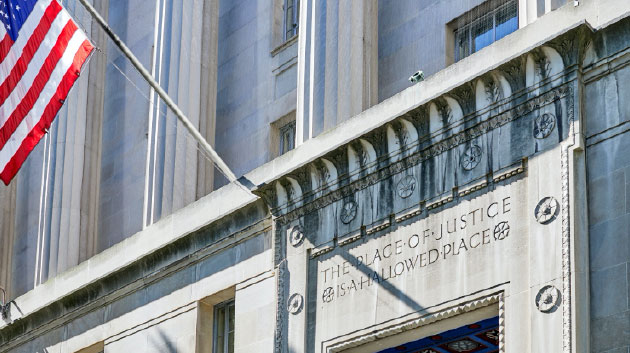U.S. Justice Department and 48 State Attorneys-General Begin Investigation into Google’s Antitrust Law Violation
Google Restricts Freedom of Speech, Violates Antitrust Laws【Part4】
Pamela Au / Shutterstock.com
Those cases mentioned in Part 1 to Part 3, the actual damage that “The Liberty Web” suffered, the statements from ex-employees, and investigations based off of massive data, gradually reveal “the Google Empire.”
In the U.S. states nationwide, as well as the federal government, began investigating Google. As mentioned in Part 1, the U.S. Justice Department sued Google for antitrust law violations in the courts.
Following suit, many State Attorneys-General are pursuing investigations. 48 out of the 50 states, the capital Washington D.C. and Territories Puerto Rico and Guam make up a bipartisan coalition with a total of 51 state and territory attorneys-general. Texas Attorney General Ken Paxton (Rep.) leads the coalition. He knows of Dr. Epstein, a psychologist who revealed how Google manipulates user’s thoughts for the first time (You can read Dr. Epstein’s interview in Part 3). Google is now being pursued by two forces.
This pursuit is not limited to antitrust laws. They intend to delve further into freedom of speech issues by revising Section 230 of the Communications Decency Act.
This act provides that social media platforms, like Facebook, Twitter and Google will not be held legally responsible for their content while at the same time as giving them the right to restrict content on their platform. This law was created at the very beginning of the Digital Age to protect the industry, but it has resulted in the current disasterous situation that allows “companies to censor content based on their judgment.”
To change the situation, President Trump has repeatedly called on Congress to repeal Section 230 and issued an Executive Order on Preventing Online Censorship in May. The Justice Department also sent a letter to congressional leaders advocating for changes to Section 230 in October.
CEO Goes Against Court Testimony
In response, on October 28th the U.S. Senate Committee on Commerce, Science and Transportation summoned the CEOs of Twitter, Facebook and Google to attend a hearing to discuss Section 230. They were also scrutinized and questioned for censoring news on Twitter and Facebook about Joe Biden’s son’s alleged corruption two weeks prior to the hearing.
Google CEO Mr. Pichai also attended the House Judiciary Committee hearing in July. He was repeatedly asked whether he had intentions to help Biden in the presidential election, where he responded that he will not have any political bias. He stated, “We won’t do any work to politically tilt anything one way or the other. It’s against our core values.” However, as Mr. Epstein described, Google obviously took actions to benefit the Democrats in this election. Lawmakers believed that this contradicts his statement, and requested a formal, written response.
Furthermore, some have called for Google’s search engine technology to be opened to the public. They ask for the infrastructure to be open sourced so that new companies can enter the search engine industry. Currently, Google makes up about 90 percent of the U.S. search engine market, and they receive more than 500 million views per day. If hundreds and thousands of new competitors enter the market, the user will have freedom of choice that lowers Google’s ability to manipulate public opinion.
Google also Violates Japan’s Antimonopoly Act
Article 19 of Japan’s Antimonopoly Act prohibits “unfair trade practices.” “Unfair trade practices” refer to any action that takes advantage of another party by abusing their superior bargaining position.
For example, “The Liberty Web” is a legitimate business partner with Google, as we upload videos with paid advertisements on YouTube. The following damage was suffered as a result of Google’s recent actions to decrease our articles’ search rankings and even remove us from the result, which drastically lowered online traffic:
- The number of paid subscribers who subscribed from reading online articles on “The Liberty Web” were greatly affected.
- Our magazine, sold in bookstores, advertise widely on our website, and thus were affected. In addition, many books published by IRH Press are bought through the links on our articles, which were therefore affected negatively by Google’s actions.
- Our magazine has channels on YouTube with paid advertisements, which are also publicized through our website; however, since access to online articles were restricted by Google, this affected the view count significantly.
These are all violations of the antimonopoly law that prohibits “unfair trade practices,” which include “discriminatory treatment in terms of trade” designated by Japan FTC.
In addition, part of our YouTube channel was censored, so advertisements were “restricted” or “prohibited.” This may even be a violation of the Constitution’s freedom of speech protections, and at least violates the antimonopoly law that prevents “unfair trade practices”, which also include “refusal to trade” and “restrictive trading” designated by JFTC.
This feature clearly shows that there are many other businesses besides our platform that have received unfair treatment from Google.
Japan FTC Must Begin Investigation
In October, the U.S. Department of Justice finally sued Google for violating antitrust laws. The Japan Fair Trade Commission must immediately begin investigations on antimonopoly violations to correct Google’s unfair trades and monopoly position.
Related
- Google Restricts Freedom of Speech, Violates Antitrust Laws【Part1】
- Ex-Employee Confesses! Behind-the-Scenes of Google Censorship
- Exclusive Research: In Swing States, Only Liberal Field Agents Received Vote Reminders on Google's Home Page during the Presidential Election in 2020, While Conservatives Got None. The power of Google.



















